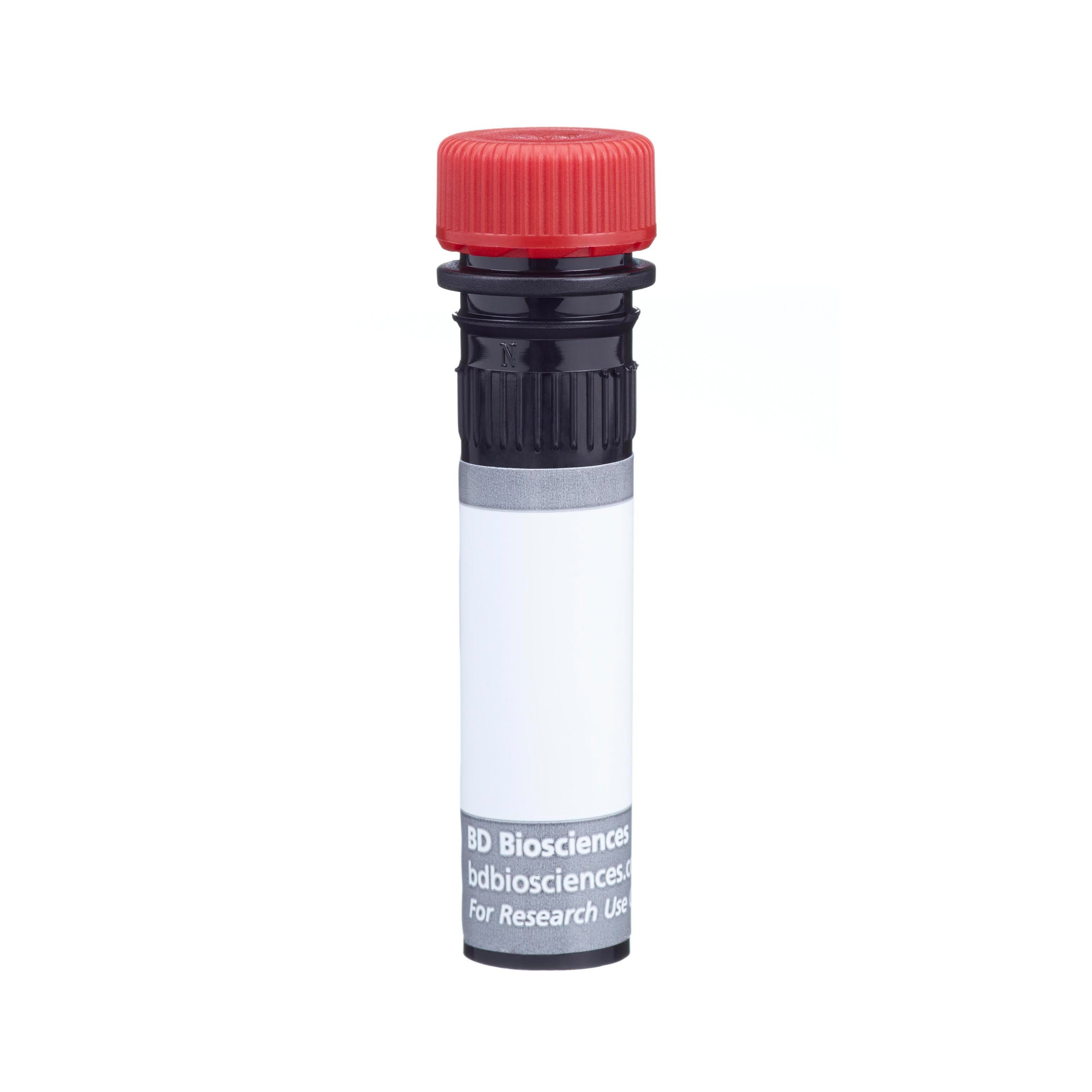Old Browser
This page has been recently translated and is available in French now.
Looks like you're visiting us from {countryName}.
Would you like to stay on the current country site or be switched to your country?


Regulatory Status Legend
Any use of products other than the permitted use without the express written authorization of Becton, Dickinson and Company is strictly prohibited.
Preparation And Storage
Recommended Assay Procedures
For optimal and reproducible results, BD Horizon Brilliant Stain Buffer should be used anytime two or more BD Horizon Brilliant dyes (including BD OptiBuild Brilliant reagents) are used in the same experiment. Fluorescent dye interactions may cause staining artifacts which may affect data interpretation. The BD Horizon Brilliant Stain Buffer was designed to minimize these interactions. More information can be found in the Technical Data Sheet of the BD Horizon Brilliant Stain Buffer (Cat. No. 563794).
Product Notices
- This antibody was developed for use in flow cytometry.
- The production process underwent stringent testing and validation to assure that it generates a high-quality conjugate with consistent performance and specific binding activity. However, verification testing has not been performed on all conjugate lots.
- Researchers should determine the optimal concentration of this reagent for their individual applications.
- An isotype control should be used at the same concentration as the antibody of interest.
- Caution: Sodium azide yields highly toxic hydrazoic acid under acidic conditions. Dilute azide compounds in running water before discarding to avoid accumulation of potentially explosive deposits in plumbing.
- For fluorochrome spectra and suitable instrument settings, please refer to our Multicolor Flow Cytometry web page at www.bdbiosciences.com/colors.
- Please refer to www.bdbiosciences.com/us/s/resources for technical protocols.
- BD Horizon Brilliant Stain Buffer is covered by one or more of the following US patents: 8,110,673; 8,158,444; 8,575,303; 8,354,239.
- BD Horizon Brilliant Ultraviolet 805 is covered by one or more of the following US patents: 8,110,673, 8,158,444; 8,227,187; 8,575,303; 8,354,239.
Companion Products






The L133.1 monoclonal antibody specifically recognizes CD31, the platelet/endothelial cell adhesion molecule-1 (PECAM-1), a 130 to 140-kilodalton (kDa) single-chain integral membrane glycoprotein that is a member of the immunoglobulin gene superfamily. The CD31 antigen is composed of six extracellular immunoglobulin-like domains belonging to the C2 group. C2 domains are also found in other members of the immunoglobulin superfamily, the cell adhesion molecules (CAMs). The CD31 antigen functions as a vascular cell adhesion molecule and is involved in the process of leucocyte migration through the intercellular junctions of vascular endothelial cells. It may also be involved in thrombosis, angiogenesis, wound healing, and inflammation. The CD31 antigen is expressed on endothelial cells, platelets, T-lymphocyte subsets, monocytes, and granulocytes. The CD31 antigen has also been found in metastatic colon carcinoma. The CD31 antigen is the only known member of the CAM family to be expressed on platelets. The antigen is localized at regions of cell-cell contacts and may function as an adhesion molecule, mediating adhesion between leucocytes/endothelial cells, leucocytes/platelets, and endothelial cells/endothelial cells.
The antibody was conjugated to BD Horizon™ BUV805 which is part of the BD Horizon Brilliant™ Ultraviolet family of dyes. This dye is a tandem fluorochrome of BD Horizon BUV395 with an Ex Max of 348 nm and an acceptor dye with an Em Max at 805 nm. BD Horizon Brilliant BUV805 can be excited by the ultraviolet laser (355 nm) and detected with a 820/60 filter and a 770LP.

Development References (11)
-
Albelda SM, Buck CA. Integrins and other cell adhesion molecules.. FASEB J. 1990; 4(11):2868-80. (Biology). View Reference
-
Albelda SM, Muller WA, Buck CA, Newman PJ. Molecular and cellular properties of PECAM-1 (endoCAM/CD31): a novel vascular cell-cell adhesion molecule.. J Cell Biol. 1991; 114(5):1059-68. (Biology). View Reference
-
Bordessoule D, Jones M, Gatter KC, Mason DY. Immunohistological patterns of myeloid antigens: tissue distribution of CD13, CD14, CD16, CD31, CD36, CD65, CD66 and CD67.. Br J Haematol. 1993; 83(3):370-83. (Biology). View Reference
-
Fawcett J, Buckley C, Holness CL, et al. Mapping the homotypic binding sites in CD31 and the role of CD31 adhesion in the formation of interendothelial cell contacts. J Cell Biol. 1995; 128(6):1229-1241. (Clone-specific). View Reference
-
Horak ER, Leek R, Klenk N, et al. Angiogenesis, assessed by platelet/endothelial cell adhesion molecule antibodies, as indicator of node metastases and survival in breast cancer.. Lancet. 1992; 340(8828):1120-4. (Biology). View Reference
-
Metzelaar MJ, Korteweg J, Sixma JJ, Nieuwenhuis HK. Comparison of platelet membrane markers for the detection of platelet activation in vitro and during platelet storage and cardiopulmonary bypass surgery.. J Lab Clin Med. 1993; 121(4):579-87. (Biology). View Reference
-
Muller WA, Weigl SA, Deng X, Phillips DM. PECAM-1 is required for transendothelial migration of leukocytes. J Exp Med. 1993; 178(2):449-460. (Biology). View Reference
-
Newman PJ, Berndt MC, Gorski J, et al. PECAM-1 (CD31) cloning and relation to adhesion molecules of the immunoglobulin gene superfamily.. Science. 1990; 247(4947):1219-22. (Biology). View Reference
-
Simmons DL, Walker C, Power C, Pigott R. Molecular cloning of CD31, a putative intercellular adhesion molecule closely related to carcinoembryonic antigen. J Exp Med. 1990 June; 171(6):2147-2152. (Biology). View Reference
-
Stockinger H, Gadd SJ, Eher R, et al. Molecular characterization and functional analysis of the leukocyte surface protein CD31. J Immunol. 1990 December; 145(11):3889-3897. (Biology). View Reference
-
Tawia SA, Beaton LA, Rogers PA. Immunolocalization of the cellular adhesion molecules, intercellular adhesion molecule-1 (ICAM-1) and platelet endothelial cell adhesion molecule (PECAM), in human endometrium throughout the menstrual cycle.. Hum Reprod. 1993; 8(2):175-81. (Biology). View Reference
Please refer to Support Documents for Quality Certificates
Global - Refer to manufacturer's instructions for use and related User Manuals and Technical data sheets before using this products as described
Comparisons, where applicable, are made against older BD Technology, manual methods or are general performance claims. Comparisons are not made against non-BD technologies, unless otherwise noted.
For Research Use Only. Not for use in diagnostic or therapeutic procedures.
Report a Site Issue
This form is intended to help us improve our website experience. For other support, please visit our Contact Us page.